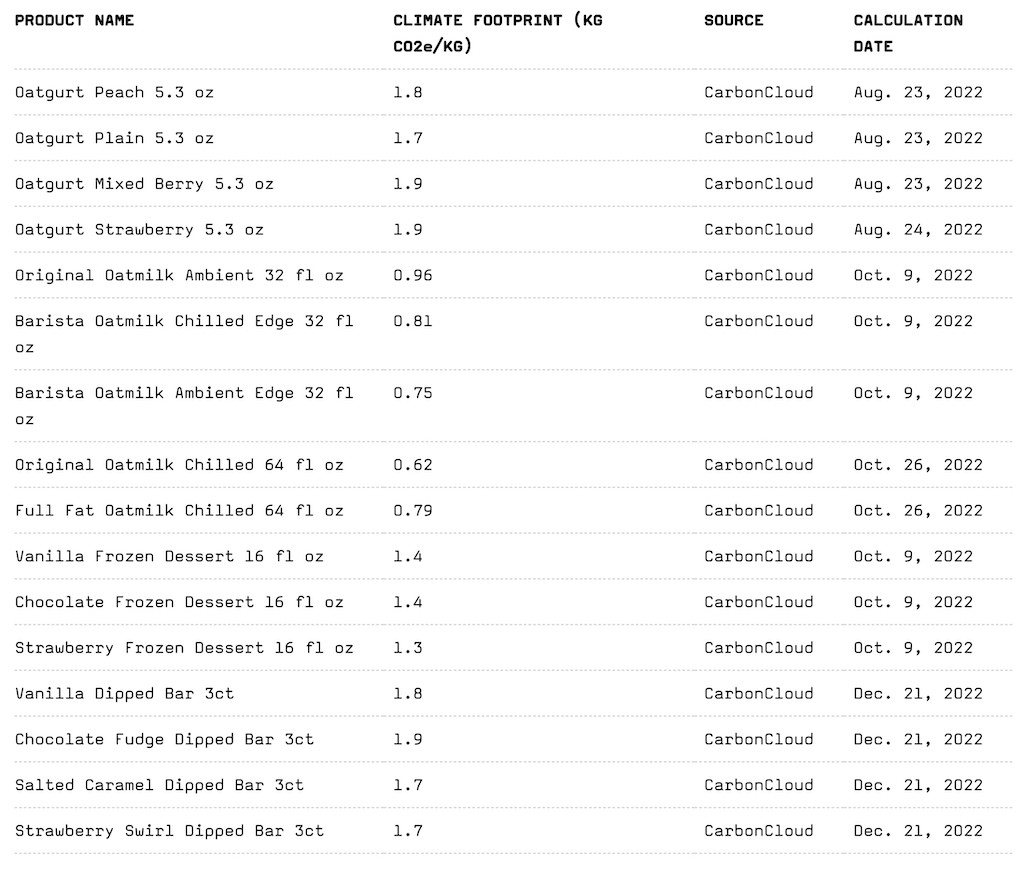Oatly Adds Climate Footprint To Revamped US Oatgurt Range To ‘Give Consumers Choices’
4 Mins Read
Oatly Group AB, the Swedish oat drink company, announced that it has added climate footprint labeling to select US products, starting with the brand’s newly reformulated Oatgurts, a range of plant-based yogurts.
Oatly Group AB, the Swedish oat drink company that sells its plant-based dairy products across the world and that helped to popularize oat milk, announced today the introduction of climate footprint labeling for select products in North America, starting with the brand’s newly reformulated line of Oatgurts, a yogurt-like product made from oats.
While the company has been publishing product climate footprints for many of its products in Europe since 2021, this marks the first time that Oatly is releasing climate footprints for some of its products in North America. The company says this new addition to its product labels reflects its belief that consumer choice and education play a vital role in shaping the future of the food system.
Calculating the climate footprint of Oatly products
Oatly’s product climate footprints are expressed in kilograms of carbon dioxide equivalents (CO2e) per kilogram of packaged food product and are calculated based on a life cycle assessment approach from ‘grower to grocer’.
According to the Oatly website, the footprints account for both the production and the distribution to market of a product, which can further be broken into the emissions cost of agriculture (including nitrous oxide from soils and carbon dioxide emissions from farm energy use, transport of ingredients, processing, packaging and distribution.
The calculations are validated through a partnership with the carbon footprint audit tool CarbonCloud, and it aggregates emissions into a single unit based on the amount of greenhouse gases emitted and their global warming potential over a 100-year period.
CarbonCloud, which like Oatly is headquartered in Sweden, works with other plant-forward food startups including Naturli, Tenzing, Naughty Nuts and Future Farm.

The Oatly website lists the climate footprint of 16 of its products as shown in the above table. The climate footprint for an Oatgurt pot ranges from 1.7 to 1.9 kg CO2e/kg. In comparison, the company’s Original Oatmilk Chilled is 0.62 kg CO2e/kg.
What is not disclosed is how these numbers compare to other foods and given that there is no industry agreed-upon standard, it can be difficult for a consumer to make comparative choices and for them to get an idea of what these numbers mean in the context of other daily habits such as taking public transportation or buying second hand clothing.
Early stages for climate labeling on food products
There is currently no standard methodology for CO2e labeling for food products. Oatly says it is committed to making products that are good for both people and the planet, and hopes that it will encourage other food companies to add climate information to their products.
“Transforming the food industry is necessary to meet the current climate challenge, and we believe providing consumers with information to understand the impact of their food choices is one way we as a company can contribute to that effort,” said Julie Kunen, Director of Sustainability at Oatly North America. “We’re motivated every day at Oatly to deliver products that are good for both people and the planet. We hope this next step of transparently bringing climate information to the forefront inspires other companies to do the same and helps consumers begin to recognize and learn about these indicators as they shop for their households.”
Climate labeling is not just a boon for consumers. It can help businesses achieve decarbonization targets. As Oxford University Professor Peter Scarborough, who has done research on eco-labeling systems, said in an interview: “Manufacturers, caterers and retailers have targets for reaching net zero [emissions] and they don’t have the tools they need to get there.”
Carbon labeling on food products is still in its very early stages but more and more food companies are adding this information to their packaging. In 2020, Unilever pledged to label all its 75,000 products and announced a pilot in the US and Europe but the FMCG giant has yet to fully roll out such labeling. In 2021, British energy drink maker Tenzing became the first soft drink brand to introduce carbon labeling to its products that same year and Brave Robot, the ice cream brand made from Perfect Day animal-free dairy proteins, also added carbon labeling to its pots. Last year, Nestlé and Sainsbury’s partnered with non-profit climate scoring tool Foundation Earth to trial traffic-light eco-labels to its products in the UK.
Newly reformulated Oatgurt range for US market
The revamped Oatgurts are the company’s first North American products to display the climate footprint on-pack. The newly reformulated range of plant-based yogurts, which are now available for retail across in stores across the US, feature fewer ingredients, new blended fruit formats instead of fruit at the bottom, and a new Vanilla flavor variety.
“The products we make at Oatly aim to make it easy for people to make the switch to non-dairy alternatives, and great taste is one of the most essential components of driving that conversion,” said Leah Hoxie, SVP of Innovation at Oatly North America. “This line of newly reformulated Oatgurts delivers on just that and more — deliciousness, great texture, and a variety of tasty flavors that people crave.”




